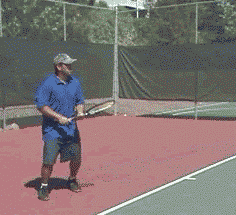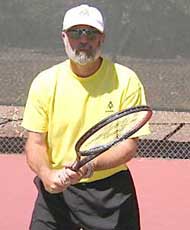<% ns_puts [mkm_getnavbar] %>
Face the Facts
What You See is What You Get
by Corky Cramer
|
|
In the following piece I am going to speak in “Face.” In other words, the language of the racquet face. I believe the more you understand about the face of the racquet, the easier it is to play the game. I could have chosen to write this piece in the language of “Grips” but I have found that people tend to get wrapped up in debating where the knuckle is on a Continental grip versus a Semi-Western grip, rather than knowing what benefits you can reap from playing with one grip or another.
In each of the photos, simply by looking at the angle of the racquet face
we can make a highly accurate guess as to strengths and weakness of the
player holding that racquet. From five courts away I can be heard yelling
at a player “How could you have
 |
Based on the assumptions we can draw from the angle of a racquet face we
can organize a solid game plan even
Certainly this is not fool proof and in accordance with Darwinian theory, we as a species must learn to adapt in order to survive. This is why each year I come across a couple of unique strokes someone has invented due a physical limitation or simply from years of repetition (by the way these people tend to be covered with braces and arm bands).
Some of the biggest changes in today’s games aren’t really changes but rather admissions of facts that have existed for over a hundred years. If you ask any pro player what grip they use on their forehand, the truthful answer is one I heard Billie Jean King tell me as a kid over thirty years ago. “ I don’t have a forehand grip I have forehand grips”.
|
|


